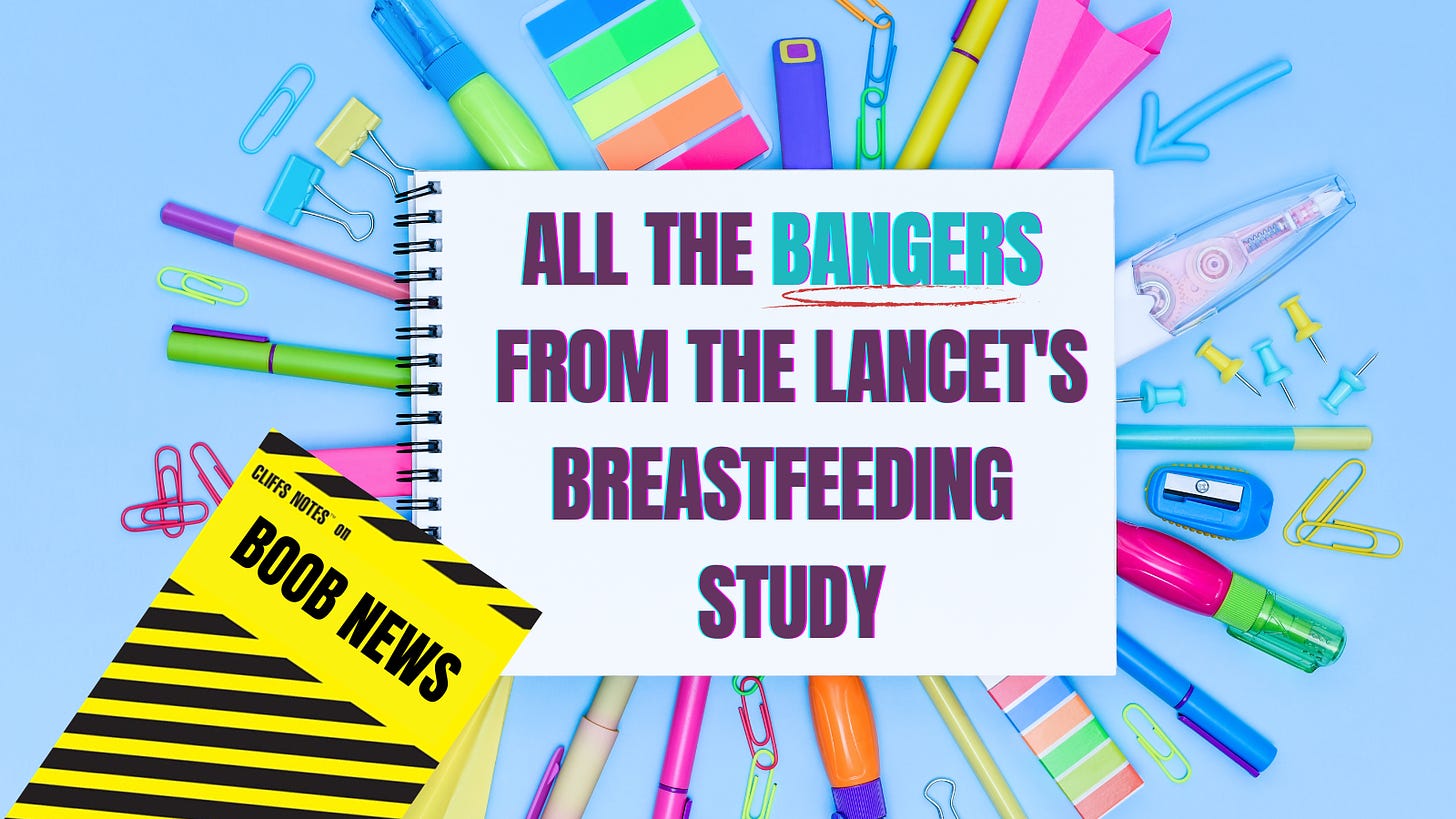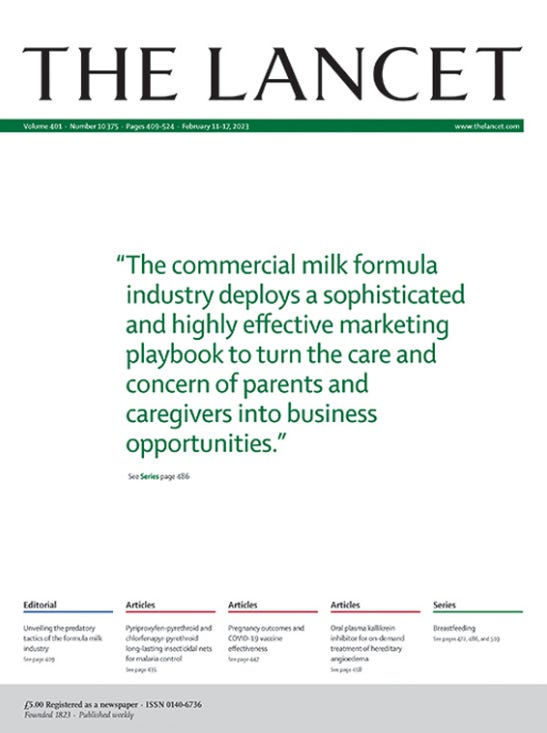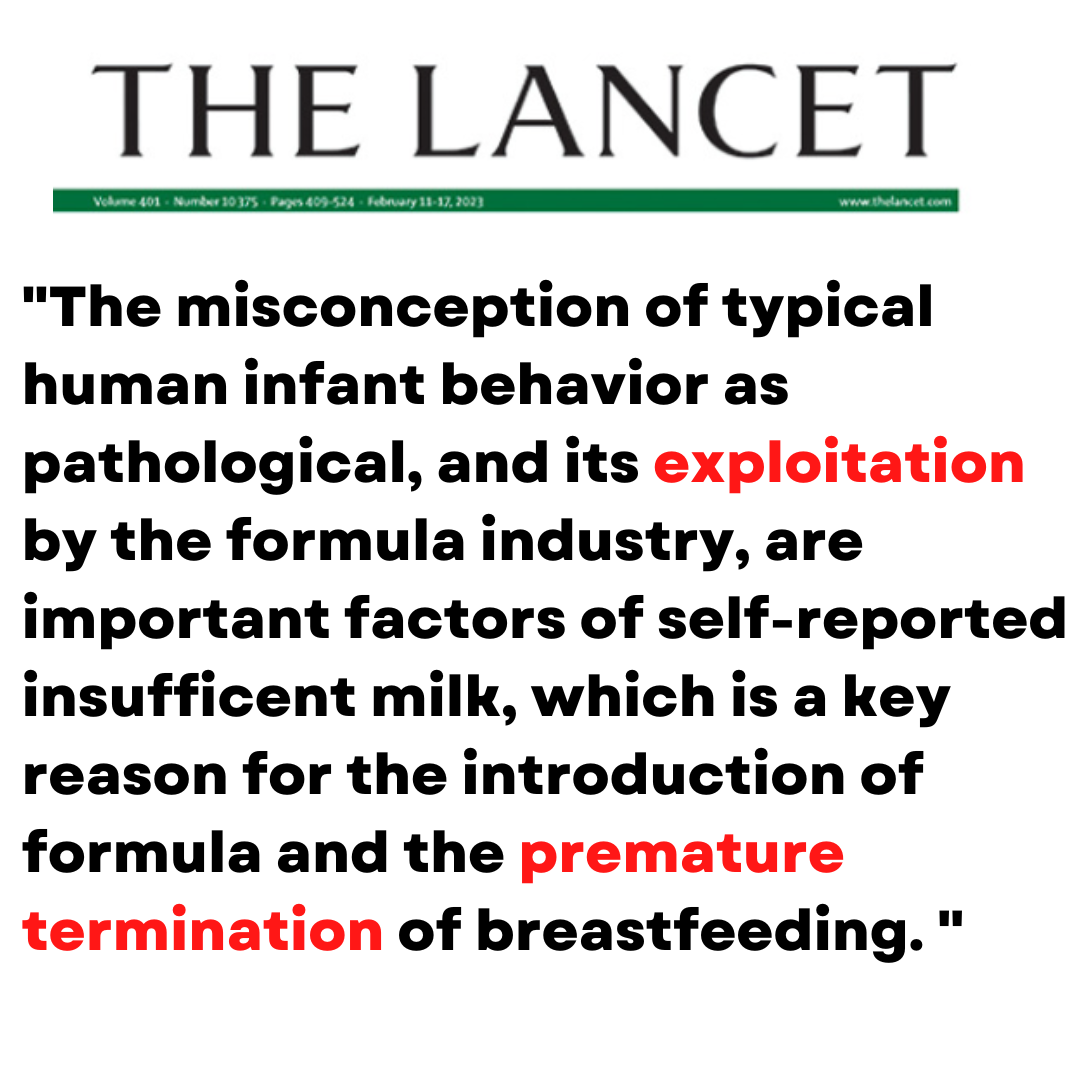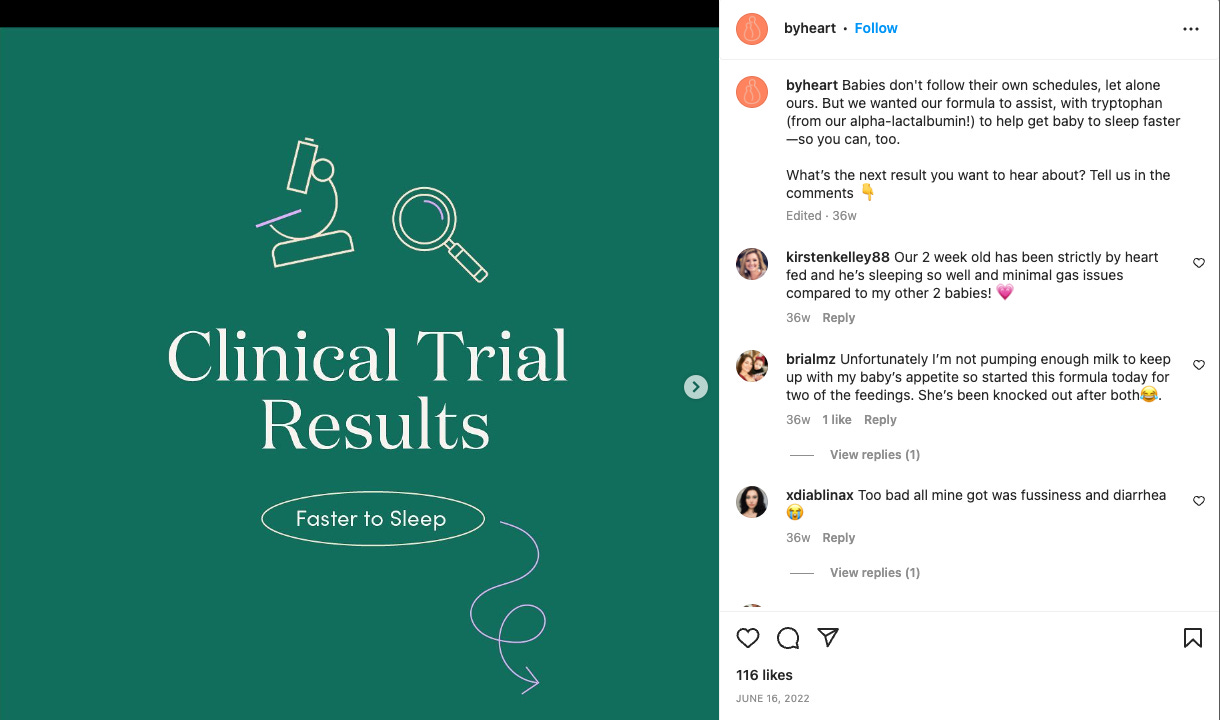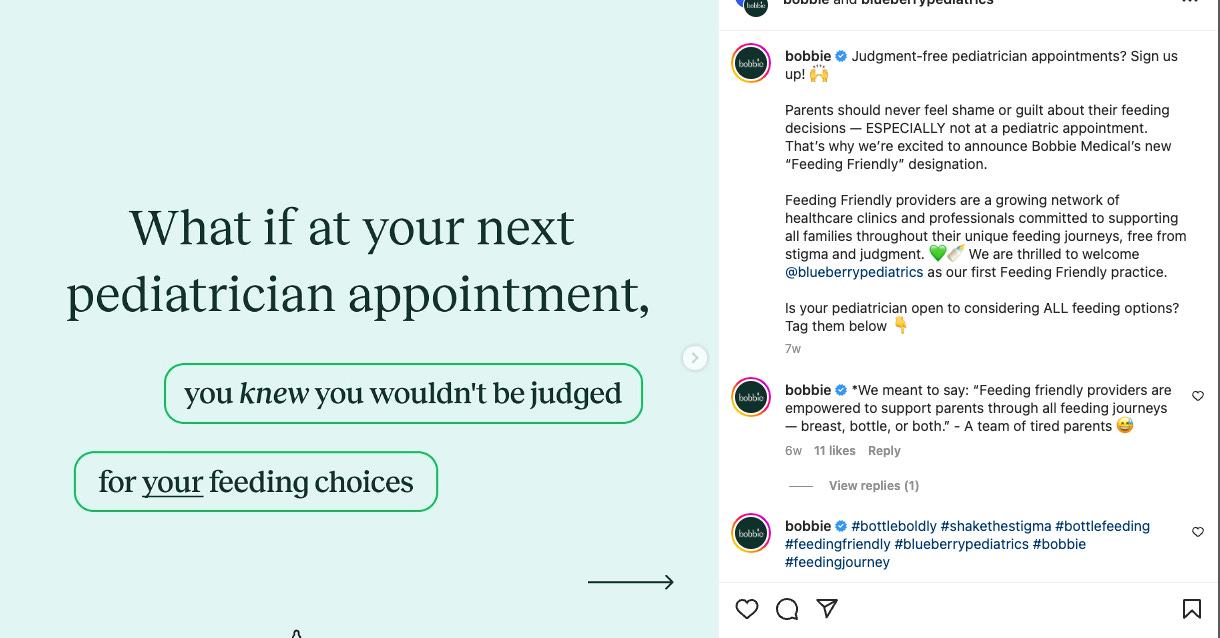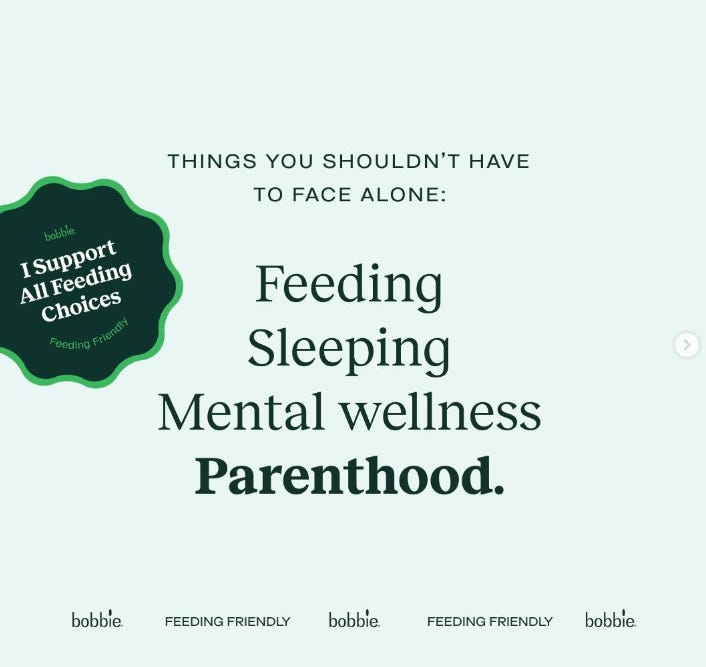All the Bangers from The Lancet's Blockbuster Breastfeeding Study
The most prestigious medical journal calls the formula industry a violation of human rights and all the other juicy bits.
📚👩🏻💻🤱🏻We are out here doing the👉 LORD’S WORK!🤘 Reading and metabolizing studies, sending furious text messages, working ourselves into a lather in the name of lactivism! Consider upgrading your subscription, friend.📚👩🏻💻🤱🏻
Earlier this month, The Lancet, the oldest, most prestigious peer reviewed medical journal, released a blockbuster series of 3 papers on breastfeeding that affirms so much of what we know but also unveiled some PROFOUNDLY disturbing elements to the…what shall we call this?
A Public Health Crisis?
The Global Decline of Best Practices for Mother/Baby Health?
A Never-Before-Seen Species Wide Disruption of Infant Feeding?
Let’s describe it the way The Lancet does:
The formula industry “impinges on the human rights of women and children, harms their health, and adversely affects society.”
In other words, the predatory nature of the formula industry is a human rights crisis.
We could talk about the findings of the incredible study for weeks! We’re going to break it up into two summaries. The first is likely stuff that, you, are beloved, attractive reader may be aware of in broad strokes but we think it’s always a treat when fancy medical journals validate our exasperated Instagram posts.
The second summary— coming out later this week—will dive into shit that kind of blew our minds?
Ok, time to dive in.
Let’s Do The Numbers: Get ready to get pisssssed
Globally, only one in two newborns are put to the breast within the first hour of life
Only 48% of the world's infants and young children are breastfed as recommended
One in three babies in low and middle-income countries are given fluids other than breastmilk during the first 3 days of life, a practice that increases the risk for breastfeeding failure.
While 97% of the formula industry is owned by shareholders in high-income countries, the harms associated with formula industry disproportionately affect low and middle income countries
Human infants and young children are most likely to survive, grow and develop to their full potential when breastfed. Despite scientific evidence more infants are fed formula milks today than ever before.
Formula Companies Bank on Your Abnormal Baby and Your Deficient Breasts
The first paper in the series, ‘Breastfeeding: crucially important, but increasingly challenged in a market-driven world,’ underscores one major point: formula companies ‘pathologize normal infant behavior’ like crying, gas, night waking, spit up in order to sell their product.
The study argues that formula marketing exploits parents’ fears that something might be wrong with their baby. Nothing is wrong, of course, because newsflash: babies cry. Despite there being no evidence to support the claims that formula will improve any of these infant behaviors, formula marketing continues to make unsubstantiated claims to the contrary.
According to the study, globally, 44.8% of mothers report that they introduce formula to their newborn because of ‘self-reported perception of insufficient milk’. It’s worth emphasizing that mothers don’t introduce formula to newborns because they actually suffer from low milk supply. Rather, it is the self-reported perception of low supply. This perception, of course, then becomes a self-fulling prophecy because the introduction of formula can decimate supply.
The study stresses the importance of prenatal education on breastfeeding and baby behaviors for mom along with more breastfeeding friendly initiatives for healthcare providers. This validates the stance that we’ve taken when it comes to hospitals and pediatricians sabotaging breastfeeding relationships. It’s a real thing.
Formula Companies Pimp Their Bogus ‘Studies’ to Doctors… Who Fall for It
The second piece in the series, ‘Marketing of commercial milk formula: a system to capture parents, communities, science, and policy’ details what we see playing out everyday across social media platforms: formula positions itself as mom-friendly and doctor approved.
Here’s how the study describes it:
Similar to pharmaceutical companies, the formula industry sponsors professional organizations and their conferences, meetings, and training, and posts adverts and publishes sponsored articles in scientific journals…creating an image of the formula company as an objective and respectable adviser.
But because formula is a considered a food product and not medical or pharmaceutical product, the industry is not obligated to provide the same level of evidence about their ‘scientific’ claims. According to the study, most formula health claims are “poorly substantiated,” “low quality” and have a high “potential for bias” due to “substantial industry research funding and influence.”
In the study’s review of pediatric association websites and Facebook accounts, 68 (60%) of 114 documented receive financial support from formula companies.
This bamboozles not only parents who consider doctors to be of high esteem in helping them make parenting decisions, but also the medical professionals themselves. Companies like Bobbie and Nestle have “research arms” that employ medical professionals and even contain an online database of articles and research for professionals to access then regurgitate on social media.
The Lancet equates this “misleading use of science” on par with the distortions made by the “sugar, tobacco, and fossil fuel industries.” That is: “current standards-setting and regulatory practices allow the [formula] industry to use evidence that it generates itself to reframe and undermine high-quality, science-based policy.”
We don’t know how much more we can scream into the void about this and endure abuse from Tik Tok moms, but maybe hearing it from a prestigious peer reviewed journal written by important people with letters after their names will help the cause.
“What We are Selling is Actually Sleep…”
Industry discussions are open about how they use parental fatigue and uncertainty to sell their product.
At an international trade event in 2017, the CEO of a marketing/research group for multinational food conglomerates, told an audience of industry insiders that infant nutrition isn't necessarily about the ingredients or innovation. He went on: “What we are selling is actually sleep…If the baby doesn't sleep for three nights and the mother is exhausted, the mother will change the infant formula. So that's what we're selling.”
A consultant from Natural Marketing Institute added that formula sells “peace of mind.”
Let’s say that these formula ghouls meant this literally, that they believe their product actually helps babies sleep. The Lancet study points that no formula helps a baby sleep. Especially since sleep consolidation is a product of human development not of cow’s milk.
But we all know what this statement is really about: preying upon exhausted and anxious parents with bogus solutions.
The Lancet Calls Out Formula Companies Who Reframe Exclusive Breastfeeding as Antifeminist:
This was one of our favorite sections, as this critique is one of the main reasons why our humble little Substack exists (though it does make us feel a bit like Dave Chapelle screaming, “WE’VE BEEN ON THAT!”). The Lancet listed out all the disgusting ways formula companies manipulate women and bastardize feminism in the name of profit. AND WE QUOTE:
“Positioning formula as an acceptable, harmless complement to breastfeeding.”
Formula enabling “women to be free of biological constraints that infer sole responsibility for infant feeding and partners to have a role in infant care.”
“Some messaging is even confrontational, depicting public health messages as antifeminist … challenging the importance of breastfeeding and paints breastfeeding advocacy as trivial moralizing. “
Alright, that’s it for part one! Part two coming out later this week.




